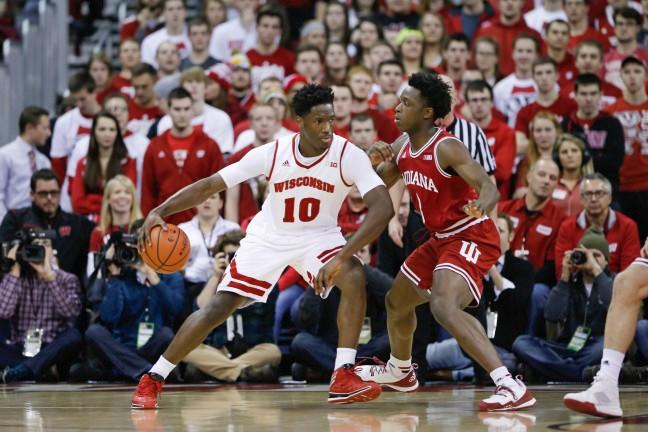As I took in the men’s basketball teams’ first game, I reflected on the sign Nigel Hayes held up during College Gameday. On the sign, he wrote “Broke College Athlete — Anything Helps” with the name of a Venmo account.
This sign ignited a mini flare-up of discussion over whether college athletes should receive financial compensation in addition to their scholarships. I agree with Nigel that the current system needs repair. But I’m less certain of what path would lead us to the best solution, and I don’t see the answer as clear-cut as he seems to.
The way I see it, the National Collegiate Athletic Association could take one of five paths.
The first path involves the NCAA doing nothing — something they thrive at — and maintaining the status quo. This is the worst option of the five.
The second path involves the NCAA mandating that all student athletes receive a sum of financial compensation — let’s say $5,000 — on top of their scholarships. My issue with this solution comes from the fact that this would lead to athletes in non-revenue sports — everything besides basketball and football — receiving financial compensation at the expense of other students.
The University of Wisconsin Athletic Department already receives approximately $8 million in subsidies from the university. The fact the university subsidizes the athletic department at all represents a whole different concern that requires its own column, but regardless — paying all of the approximately 1,000 student athletes directly would require another $5 million coming from the pockets of regular students that would ultimately go into the hands of student athletes. This is an untenable solution and in all honesty, I would likely protest enacting such a measure.
Men’s basketball: Koenig, Hayes approach their final year as more than just basketball players
The third path involves the NCAA mandating that all student athletes who participate in revenue-generating sports receive a sum of financial compensation. This is a path I am more likely to support, as these athletes bring, in many cases, massive revenue to their schools and should receive compensation for that.
But there is still an issue with this path. Why should a player such as former Louisiana State University standout Ben Simmons receive the same compensation as players who ride the bench? A player like Simmons brings in millions of dollars on his own, while some of his teammates collect less revenue for the school than the scholarship they receive. This leads us to the fourth path.
The fourth path involves treating college athletics as a free market, where schools can offer a sum of money to a player to get them to play for their school. For instance, the UW could have offered Hayes $2 million to spend a season playing basketball for them before leaving for the National Basketball Association.
Men’s basketball: Badgers win emotional duel of the Gards in exhibition match with UW-Platteville
This fourth path is the way most things in America function, but there is still a significant downside.
If we chose to compensate players in this way, non-revenue sports would likely cease to be financially tenable options for universities.
Currently, money from revenue sports is redistributed to other sports, allowing a school like UW to have 23 varsity sports teams, the majority of which garner very little attention. But in this free market system, that revenue would cycle back into the revenue sports, leaving no money left over for non-revenue sports. And once again, if they chose to continue funding and grooming the non-revenue sports at the expense of regular students, I would protest the measure.
The fifth path involves the NCAA removing the ridiculous ban that prevents student athletes from receiving compensation based on their statuses as a student athletes. The fifth path would allow somebody like Hayes to sign autographs for compensation, or endorse products. It would also allow athletic boosters to pay athletes cash payments as they saw fit.
This fifth path allows for a continuation of non-revenue sports and also allows for each athlete to receive a compensation reflecting their individual level of contribution. This fifth path would have allowed Hayes to list his actual Venmo account and receive donations from those willing to give. This fifth path allows for the athletes to receive fair compensation without impeding the university’s budget, and thus the tuition of their classmates.
The only thing preventing us from embarking on this fifth path is the foolish idea that college athletes represent amateur athletics, which could not be further from the truth. In fact, the only thing still amateur about college athletics is the NCAA’s refusal to compensate athletes.
Connor Allen ([email protected]) is a junior majoring in economics and history.





















